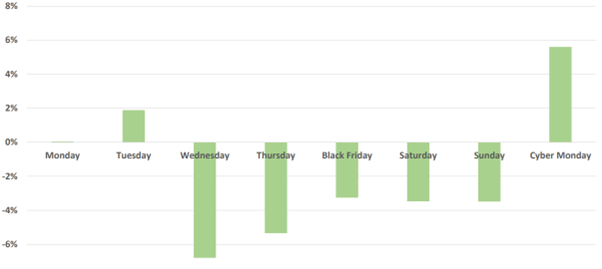By Ellie-Rose Davies, Content Executive at IMRG
It’s time to prepare for the busiest week of the year, Black Friday week, happening from Monday 25th November to 2nd December (Cyber Monday).
Read on to benefit from historic trends, insights into the current market, and tips that will help you boost growth and manage workload.
Current trends signify demand is yet to come
‘Black November’ has gotten off to a slow start, with the total online market experiencing declines in w/c 27th October, which includes 1st and 2nd of November, and w/c 3rd November. Source: IMRG’s Online Retail Index (Digital Dashboard)
Source: IMRG’s Online Retail Index (Digital Dashboard)
It may be that demand customer demand is being pulled back as Black Friday falls one week later than it was last year (29th November 2024 versus 24th November 2023), making tough yearly comparators.
Other factors are at play, such as decision fatigue, where there is an increase in choice that could make Black Friday an overwhelming experience for customers, and subsequently impact conversion.
Promisingly, by Black Friday, the entire UK workforce will have been paid, meaning that retailers may see significant growth on this day. Last year, given that not everyone was paid by Black Friday, it meant that Cyber Monday performed better – this year this day may see declines.

**For a summary of last year’s findings, read IMRG’s Black Friday Review 2023**
There was only two days that experienced positive growth last year (Tuesday and Cyber Monday). Our community of industry experts have shared some advice to help retailers see more positive days this year.
Black Friday week advice:
1. Optimise discounts and pricing
Retailers can benefit from being more strategic with discounting and pricing this Black Friday, ensuring that they protect their profits whilst fulfilling customer expectations.
Dan Bond, VP of Marketing at RevLifter exclaims that ‘Retailers should be prepared to learn and adapt as they go during Black Friday week. Consider using data to refine the targeting and the kinds of offer you’re using. Focus on high-intent segments, such as cart abandoners or repeat visitors, as they can quickly boost conversions.
He recommends retailers to ‘Ensure promotions are relevant and varied, using strategies like tiered discounts to encourage higher spend without overwhelming inventory.’ Also, ‘Be mindful of messaging frequency; maintaining excitement without fatiguing customers is key. Above all, be ready to monitor real-time data closely to adapt fast and capture last-minute opportunities.’
Similarly, Francois Rychlewski, VP of sales EMEA at SheerID explores the value of customer targeting and the kinds of offers available. He shares that ‘To stand out during the chaos of Black Friday week, retailers can do more than just broad discounts—they can provide exclusive offers that speak directly to specific communities.’
Francois shares, ‘Gated deals for groups like students, healthcare workers, or military members can cut through the noise and make these customers feel valued. These offers can go beyond your standard Black Friday discounts, providing an incentive that feels truly special.’
Considering the pricing of items more broadly, Hemang Nathwani, Sales Director at Price Trakker reveals that ‘For Black Friday week, agility is essential. Some retailers who usually monitor prices daily are now requesting data multiple times a day to keep pace with market changes.’
Hemang reflects on how ‘maintaining consistent, competitive pricing across channels, without eroding margins, significantly boosts conversions. Retailers who began campaigns early can make slight adjustments to maximise visibility and engagement through Cyber Monday.’
Pricing experts at Prisync highlight the increasing adoption of dynamic pricing, particularly during Black Friday, as a strategy to ‘balance competitiveness with profitability.’
Prisync reminds retailers that they can ‘adjust prices based on demand and competitor activity to attract a range of customers.’ Budget-conscious consumers tend to appreciate consistent markdowns, while premium brands can selectively implement dynamic pricing for their flagship items, helping to maintain brand value.’
2. Be where customers are
To maximise the impact of Black Friday campaigns, retailers can ensure their promotions reach customers wherever they are. A well-executed omnichannel strategy, with coordinated marketing efforts across all channels, can effectively communicate offers and engage shoppers.
Alexander Otto, Head of Corporate Relations at Tradebyte says, ‘Essential elements of Black Friday preparation include demand forecasting, optimising retail media and marketplace listings for maximum visibility, and ensuring a seamless omnichannel customer experience.’
‘AI-driven demand forecasting helps align inventory with anticipated customer needs, while real-time tracking facilitates timely restocking of popular items. Equally crucial is maximising visibility on retail platforms such as Amazon where shoppers increasingly begin their journey,’ says Alexander.
He continues, ‘By ensuring a unified approach across on and offline channels, brands can enable customers to shop, access promotions, and receive support consistently across platforms to boost engagement and ensure competitiveness during peak periods.’
Tom Gandhi, Head of SEO at NOVOS shares some ways that retailers can effectively communicate with customers. He says, ‘When capitalising on Black Friday, it’s important to have your landing page live ahead of time with an email capture to alert customers who fill it when it becomes active.’
them e.g. Black Friday Trainers (1,900 SV) to give yourself the best chance of capturing demand. At the same time, ensure your homepage is updated when your campaign goes live to direct and inform customers of the discount or offer available, along with the timeframe,’ says Tom.
3. Watch out for issues concerning payments and fraud
Black Friday’s welcomes a surge in transactions which presents not only an opportunity for retailers but also a challenge in managing payments and fraud prevention.
As Nikhita Hyett, EMEA General Manager at Signifyd exclaims, ‘British consumers remain cost-conscious heading into Black Friday week, trading down to generic brands, researching deals extensively and forcing retailers to adapt by offering deep discounts and value-based promotions. The trends have been dominant since 2022 when retailers faced the challenge of surging inflation and 87% of British consumers reported a rise in their living costs.’
‘Fast forward to today when merchants are facing all those pressures plus feeling the pressure to improve the customer journey to meet shoppers’ heightened expectations, including the need to provide smooth, secure payment options.’ Nikhita argues that ‘By offering diverse choices like digital wallets and Buy Now, Pay Later, and implementing robust fraud prevention, retailers can attract cautious shoppers and secure conversions amid ongoing economic concerns.’
Monica Eaton, Founder and CEO at Chargebacks911 warns retailers that ‘if you don’t take control and implement post-transaction failsafes, then a growing portion of the profits from the shopping holidays could be swallowed up’
She highlights the risks of chargebacks during Black Friday and Cyber Monday – ‘A percentage of the customers who buy from merchants on Black Friday and Cyber Monday might see the charges in their bank statements and not recognise them, believing that they have been the victim of fraud. For most consumers, contacting their issuing bank is the first step they take to dispute a transaction.’ Monica adds, “There are plenty of consumers who experience buyer’s remorse and knowingly dispute legitimate charges to reclaim their money.’
To protect profits, Monica advises retailers to ‘Run test transactions with your own credit cards to make sure the checkout process is seamless… make sure that bank statement descriptors actually describe the transaction… and implement software that gathers all end-to-end data from transactions.’ These steps, she explains, can help reduce confusion and defend against illegitimate chargebacks.
4. Refine your post-purchase offerings and limit challenges
With Black Friday week around the corner, retailers can make sure that they’re top of everything post-purchase, from managing high demand to delivering great customer service and handling returns smoothly.
Experts at fulfilmentcrowd exclaim, ‘Streamlining fulfilment processes is crucial to handle peak demand; consider flexible warehousing or partnerships with fulfilment providers to alleviate bottlenecks. Keep a close eye on stock levels and avoid overpromising on delivery dates, as customer expectations are high.
‘Retailers like ASOS and Argos have succeeded by ramping up real-time stock visibility and delivery updates, creating trust during the intense shopping week. Preparation and adaptability are key!’
PayPoint adds, ‘Parcel services and store footfall will increase considerably during this busy period, so retailers should keep customer service standards as a high priority. Simple processes, such as checking daily inventory reports and clearing parcels from the store to make space for new ones that come, will help ensure operations run smoothly.’
‘Additionally, using services which allows stores to process parcels quickly from a mobile device will also help streamline activity and free up counter space for customers and to display any Black Friday offers for impulse purchases.’
Gary Carlile, Executive VP of Customer Growth at nShift joins this conversation, revealing ‘Almost two thirds (64%) of consumers are expected to shop online on 29 November. However, our recent Consumer Home Delivery Report in partnership with IMRG found that 67% of consumers are concerned about long delivery times and their ability to track orders while a further 63% worry about not being able to submit a return and get some form of credit back.’
‘To avoid missing out on this massive opportunity, retailers can optimise their infrastructure to ensure shoppers’ worst fears don’t come to fruition. This means having sufficient delivery capacity to scale, meet demand, increase choice, and reduce costs.’
‘Aside from capitalising on the Black Friday demand, if shoppers have a positive experience when buying internationally, it’s much more likely that they’ll return for future purchases,’ says Gary.
Global Chief Marketing Officer at parcelLab, Noel Hamill, emphasises the value of upholding the delivery promise and communicating with customers effectively.
Noel expresses that ‘customers have successful peak seasons by leveraging optimised delivery date promises, informative communications, and personalised recommendations. While planning well in advance is key during this time, there is still time to make sure your brand has emails ready for any delays so you can be proactive rather than reactive. By focusing on these key areas, retailers can maximise their sales potential and create customers for life.’
5. Don’t forget about returns
Marko Kiers, Chief Commercial Officer at ReBound Returns reflects on the importance of offering a smooth returns process for Black Friday customers; ‘Retailers are preparing for Black Friday and Cyber Monday – but are they ready for Returns Tuesday? Our latest research found that one-in-three shoppers are expected to send back their sales purchases, with the majority of returns arriving back on Tuesday 10th December 2024. Last year, returns volumed increased by 145%, and are predicted to increase again in 2024.’
“Despite it being the busiest time of year for retailers, customers still expect the same high level of service… A bad customer experience during Black Friday sales could lose a repeat customer before Christmas.’
Marko urges retailers to “make sure their returns policy is clear and transparent… the efficient processing of returns means consumers will get their refund quicker, ensuring their satisfaction, while stock can go back on sale to satisfy demand from other shoppers.’
‘Black Friday week might be the busiest for sales, but the spike in returns will peak on Returns Tuesday and stretch into January.’
To summarise, retailers can prepare for Black Friday by:
- Using smart discounting: Use targeted offers and dynamic pricing to balance sales and profitability.
- Embracing omnichannel strategies: Ensure offers reach customers across multiple platforms with accurate inventory.
- Getting on top of payments and fraud: Offer secure payment options and prevent fraud to protect profits.
- Optimising post-purchase: Streamline fulfilment, communicate clearly, and manage returns efficiently.
- and effectively managing returns: Prepare for a spike in returns, especially on Returns Tuesday, December 10th.
IMRG will be providing comprehensive analysis of Black Friday week performance at their upcoming events. Be sure to be there:
Director-level event: Directors in Focus: Black Friday Lunch 2024 – IMRG
Manager-level and above event: Christmas Connect Live 2024 – IMRG
Manager-level and above event: Black Friday 2024 A Full Virtual Recap – IMRG
Published 21/11/2024



